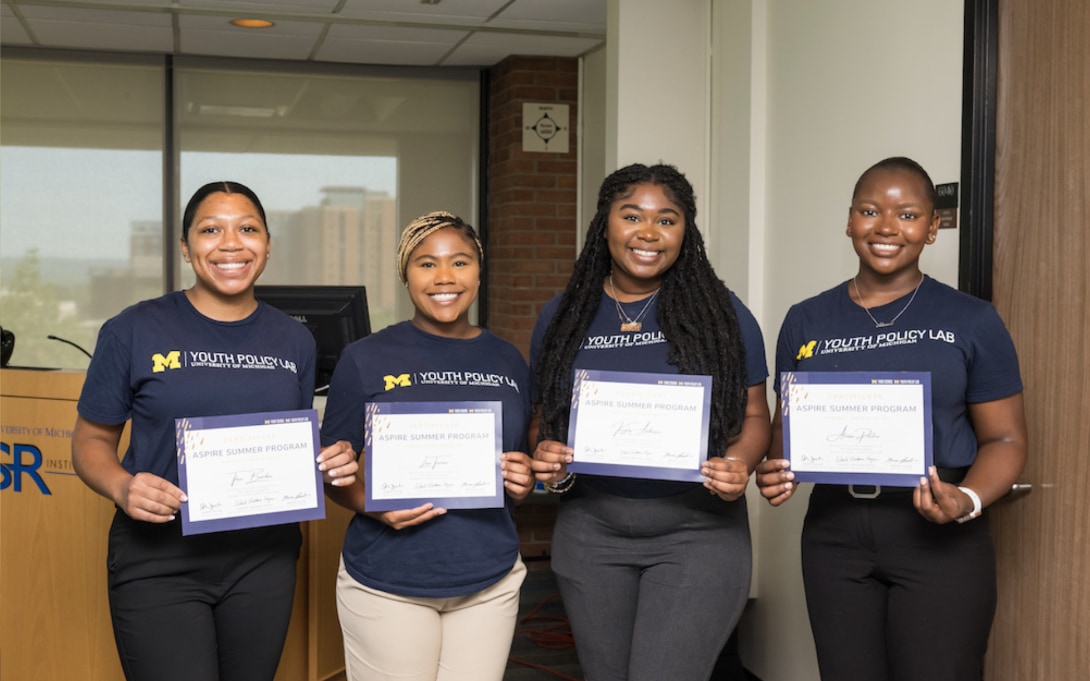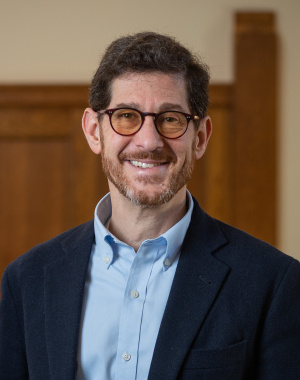
Summer 2023 proved to be eventful and rewarding for the inaugural Applied Social Policy Internship and Research Experience (ASPIRE) cohort. The program, a collaboration between the Gerald R. Ford School of Public Policy and Spelman College, provided hands-on experience to Spelman students interested in social science research. ASPIRE fellows Keyla Anderson, Theo Burden, Aleasa Parker, and Lexi Turner spent seven weeks in Ann Arbor cultivating their passions for social policy change through the Youth Policy Lab (YPL) led initiative.
“They brought a fresh perspective and asked great questions and were all in on everything we asked them to do,” said Robin Jacob, faculty co-director and founder of the Youth Policy Lab. “We're doing this on a shoestring budget this year to get it launched, and so many staff at YPL donated their time by helping run professional development sessions and being on site mentors for the students. It will be sad to see them go.”
“We would also like to thank the Survey Research Center at the Institute for Social Research for its great support for these students,” she added.
The fellows engaged in individual research projects within YPL's key policy domains: early childhood education, maternal and infant health, adolescent mental health, career technical education, and workforce development. Through these projects, and in close collaboration with U-M faculty and staff, they acquired valuable insights into the world of applied social sciences and public policy research and gained a clearer vision of potential career paths in the field.
“I was interested in this opportunity because I resonate with the Youth Policy Lab's mission,” said Anderson, a rising political science senior. “I really liked the work that they were doing and thought it would be a great experience to jump into the public policy world and see what it would look like for me if I were to enter this field.”
Turner’s research advisor, Erykah Benson, a third-year PhD candidate, said it was amazing to watch her define her research question. “She worked on it and suddenly discovered it was something she was passionate about.”
In addition to their research endeavors, their time at the University of Michigan was infused with fun and engaging community activities.
“I really liked that so many different events were planned for us. If we said we were interested in doing something in Ann Arbor or Detroit they made it happen for us,” said Turner, a rising sociology and anthropology senior. “We went to Detroit with the Center for Racial Justice. We went to museums, kayaking, and had dinner with the Dean.”
The program culminated in a capstone presentation showcasing their research findings on August 4.
Anderson presented her research on discipline in Detroit schools, and found interesting and unexpected correlations that showed that students with more interaction with the criminal justice system were the least likely to find it biased.
After the presentation, Brian Jacob, YPL co-founder noted, “That’s what makes research so interesting. Sometimes you find counter-intuitive results that spur you to do more research.”
Parker, a rising junior psychology major, recommends the program. “I think students who are interested in policy should go for this opportunity, especially if you’re looking to be in a space that's going to invigorate you and really help you grow, not only do you learn something that you can apply in college, but you also learn things that you can apply after college.”
As the first ASPIRE program draws to a close, there is palpable excitement for future cohorts.
“In its pilot year, the ASPIRE program empowered our fellows with hands-on policy analysis training to examine the complexities of real-world issues impacting our youth,” Dean Celeste Watkins-Hayes said.
She noted that the capstone presentations were surprising and intriguing, and showed the importance of mixed methods research and the value of using qualitative and quantitative data to examine key policy issues.
Watkins-Hayes concluded, “Looking ahead, we are excited to build upon the accomplishments of the pilot year and expand the initiative's reach to collaborations with additional outstanding schools, ensuring that more students can benefit from this transformative experience.”

